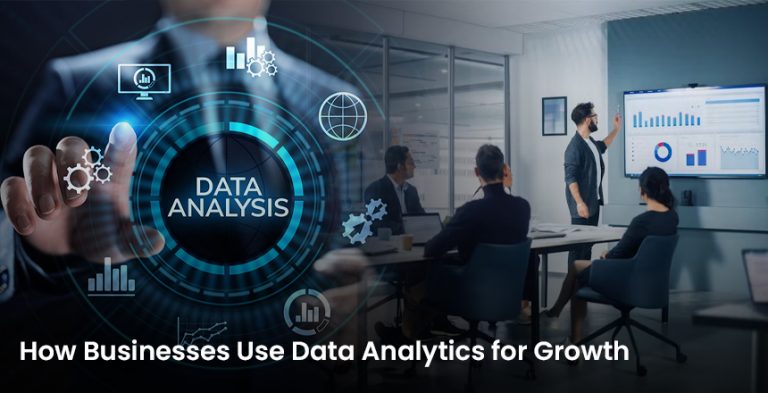Chances are high that in case you have decided to pursue a career in data or business strategy field, you must have come across two vocations; Business Analyst (BA) and Data Analyst (DA). The two may sound alike and yes they are both about data, but they center on entirely different things.
Which one should you therefore take in 2025? The abridged reply: it depends on you, your interests, abilities or career aspirations.
Let us demystify and you can then make the best choices.
So What is a Data Analyst?
A Data Analyst deals basically with raw information numerals, graphs, tables, and databases. Their task is to gather data, clean that up, detect patterns and respond to certain questions.
For example:
- Which are the best selling products of the last quarter?
- What were the highest customer dropouts in which region?
- When is most traffic received on the site?
Such tools as Excel, SQL, Python, and Power BI are used by the data analysts in their work. They are very closely collaborating with databases and lots of their time is spent analyzing the numbers.
- Primary software uses: excel, SQL, power BI, Python, Tableau
- Focus: Data digging and identifying answers
- Common examples of industries: IT, e-commerce, marketing, banking, healthcare
The Role of a Business Analyst.
A Business Analyst can be viewed as a connector between the information and the decision makers. They reach reports, communicate with teams, learn the needs of the company and recommend the enhancement depending on what the data indicates.
For example:
- Why is the satisfaction level of the customers declining in one region?
- Shall we sack into a new product line?
- What are the ways to minimize delivery delays?
Not every time business analysts deal with raw data. They do this instead by using the available reports and dashboards, conducting meetings, and giving more attention to strategy and communication.
- Primary tools: Excel, PowerPoint, Power BI, a little bit of SQL
- Specialty: Data-driven business problem solving
- Industries: Consulting, retail, finance, operations, logistic
Key Differences at a Glance
| Aspect | Data Analyst | Business Analyst |
| Main Task | Analyzing data and creating reports | Understanding business needs and making decisions |
| Tools Used | Excel, SQL, Python, Power BI, Tableau | Excel, Power BI, PowerPoint, some SQL |
| Skills Needed | Data handling, problem-solving, attention to detail | Business understanding, communication, decision-making |
| Job Style | More technical, data-focused | More strategic, people-focused |
| Career Path | Data Scientist, Data Engineer | Product Manager, Business Consultant |
Salary Comparison in India (2025)
Salaries vary depending on skills, location, and company. But here’s a general idea:
| Role | Fresher (0–2 yrs) | Mid-Level (3–5 yrs) | Senior (5+ yrs) |
| Data Analyst | ₹4–6 LPA | ₹7–12 LPA | ₹15–20+ LPA |
| Business Analyst | ₹5–8 LPA | ₹9–14 LPA | ₹18–25+ LPA |
Business analysts usually attract a slightly higher salary at the beginning due to the nature of the work that they take part in. However, the gap can be bridged fast through the deployment of knowledgeable data analysts on Python and BI tools.
Which of these Careers Is Better Suited to You?
So how do you decide?:
Pick Data Analyst in case you:
- Like numbers and patterns
- Similar to technical problem solving
- Desire to use such tools as SQL, Excel, Python
- Choose to work on deep-dives alone than attend meetings
- Wish to eventually transition into data science, or analytics
Pick Business Analyst when you:
- Similar to the acquaintance with business processes
- Enjoy face to face meetings, discussions and communications
- Feel the desire to concentrate on strategy, planning and improvement
- Client or management facing positions preferred
- Would like to be a product manager or consultant
Are You Able to Interchange the Two?
Yes, most practitioners begin by becoming a data analyst then transition to being a business analyst or vice versa. Know how to work with data and explain it and you are valuable in both roles. Indeed, employers are fond of employees who can relate to both worlds.
There are even those who do hybrid jobs such as the position of Business Data Analyst where one works with data yet can also contribute to the business strategy.
As a newbie, What to Learn First
Regardless of which faction you choose, (DA or BA) the initial set of skills are nearly identical:
- Excel (essential of both)
- SQL (particularly if a data analyst is needed)
- Power BI/ Tableau (in dashboards)
- Simple business knowledge (as BA)
- Speech and oral narration competence
Want to learn how to do these things? At Your Degree we offer programs that you can learn at your own pace, as a beginner without any experience.
Final Thoughts
Both the data analyst and business analyst are great career choices because they promise a positive job growth and high demand with excellent salaries, which will be in 2025. The trick is it is more technical or strategic which is of personal interest to you.







